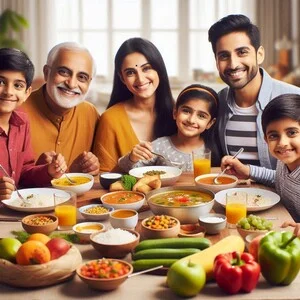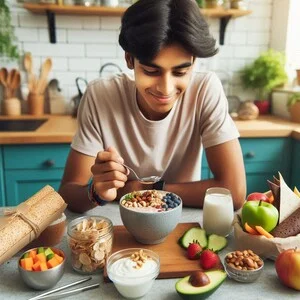Discover age-specific pediatric diet plans tailored for Indian kids, from 6 months to teenage years. Learn essential foods and nutrition tips to support growth, immunity, and healthy habits at every stage.
What Every Indian Parent Needs to Know
Proper nutrition in childhood impacts both physical and mental growth, helping children maintain energy, build immunity, and support brain development.
Best Nutritionist in Bangalore
Consult 19-year-experienced Chief Nutritionist Vasanthi, in person at HSR, Koramangala, Bellandur, Haralur, Electronic city, or online across India.
Table of Contents

Pediatric Diet Plans for Infants (0-12 Months): First Foods for Growth
In infancy, babies get their nutrients primarily from breastmilk or formula, and around six months, they begin transitioning to solids. Nutrient-rich, easy-to-digest foods are essential at this stage.
1. Breastmilk or Formula (0-6 months)
- Importance: Breastmilk provides essential antibodies and nutrition tailored to your baby’s needs. If breastfeeding isn’t possible, formula is a viable alternative.
- Frequency: Feed on demand, usually every 2-3 hours.
2. Introducing Solids (6-12 months)
- Key Foods: Start with simple purees of fruits like apple, banana, and vegetables like carrot and sweet potato. You can introduce dal water, rice cereal, and ragi (finger millet) as these are highly nutritious and gentle on digestion.
- Tip: Gradually add new foods and textures, ensuring each food is introduced separately to watch for any allergies.
Toddler Nutrition (1-3 Years): Boosting Immunity and Supporting Growth
Toddlers are known for being picky eaters, making this an ideal time to introduce a variety of healthy foods while building healthy eating habits.
1. Protein for Growth
- Key Foods: Include dals, paneer, eggs, and lean meats for protein. Lentil soup or moong dal khichdi can be nutritious options.
- Tip: Indian toddlers often enjoy dishes like dal, rice, and soft roti. To make them tasty, experiment with mild spices.
2. Calcium for Bone Health
- Key Foods: Milk, curd, paneer, and green leafy vegetables like spinach are great for calcium. Yogurt smoothies with fruit are often a hit.
- Tip: Try incorporating milk into oatmeal if your toddler resists plain milk.
3. Iron for Energy
- Key Foods: Iron-rich foods like spinach and beans support energy and prevent anemia.
- Tip: Pair iron sources with foods high in vitamin C, like oranges or tomatoes, to improve absorption.

Preschool Nutrition (4-5 Years): Encouraging Healthy Eating Habits
As children start school, they need energy to stay active and focused. Balanced meals can fuel their physical activities and support cognitive development.
1. Fiber for Digestive Health
- Key Foods: Whole grains like oats, whole wheat, and brown rice; fruits like apples and bananas; and vegetables like carrots and cucumbers.
- Tip: Start the day with high-fiber options like whole-grain chappati to keep them full and energized.
2. Vitamins A and C for Immunity
- Key Foods: Brightly colored vegetables and fruits like carrots, bell peppers, oranges, and guava provide essential vitamins for immune health.
- Tip: Smoothies or fruit salads can make vitamins more appealing to young kids.
3. Protein for Sustained Energy
- Key Foods: Eggs, milk, curd, dals, and chicken.
- Tip: Eggs can be scrambled, boiled, or added to parathas for a protein-packed breakfast.

Elementary School Nutrition (6-12 Years): Building Strength and Stamina
At this age, kids are active and need balanced meals to support their growth and learning abilities. School lunches and after-school snacks become key components of their daily nutrition.
1. Complex Carbohydrates for Energy
- Key Foods: Whole grains, brown rice, rotis, and oats provide lasting energy.
- Tip: Include chapati wraps with veggies or rice pulao with mixed vegetables for a nutritious, balanced meal.
2. Healthy Fats for Brain Development
- Key Foods: Nuts like almonds, walnuts, and seeds (flaxseeds, chia seeds) provide omega-3s that support brain health.
- Tip: Add nuts to homemade laddoos or make a dry fruit trail mix for an after-school snack.
3. Hydration for Focus and Energy
- Importance: Dehydration can impact focus, energy, and overall health.
- Tip: Encourage water intake and include hydrating foods like cucumber, oranges, and watermelon in their diet.

Teenage Nutrition (13-18 Years): Fueling Growth Spurts and Supporting Mental Health
Adolescents undergo rapid physical changes and experience increased social and academic pressures. Proper nutrition during this stage can support their physical health, energy levels, and mental well-being.
1. Protein for Muscle Development
- Key Foods: Include lean meats, dals, beans, paneer, tofu, and dairy products for muscle growth.
- Tip: Teenage athletes can benefit from protein-rich snacks like chana (chickpeas) and boiled eggs.
2. Iron and Calcium for Bone Health and Energy
- Key Foods: Iron-rich foods like spinach, beans, and fortified cereals; calcium-rich foods like dairy, green leafy vegetables, and fortified juices.
- Tip: A spinach and cheese sandwich or paneer bhurji can be a delicious way to meet calcium needs.
3. Healthy Fats for Hormone Balance
- Key Foods: Nuts, seeds, olive oil, and avocados support hormone regulation, which is crucial during puberty.
- Tip: Add nuts to smoothies or sprinkle seeds over salads to encourage healthy fat intake.
Practical Tips to Encourage Healthy Eating for Indian Kids
- Make Mealtimes Enjoyable: Family meals encourage healthy eating habits. Avoid screens and create a positive atmosphere around meals.
- Involve Kids in Meal Prep: Kids are more likely to eat what they help prepare. Let them pick fruits and vegetables or assist with cooking.
- Plan Balanced Snacks: Offer a mix of carbs, proteins, and healthy fats in snacks. Try options like fruit with yogurt, peanut butter on whole-grain toast, or a handful of trail mix.
- Limit Sugary Drinks: Encourage water and limit sugary drinks, which can lead to excess calorie intake and tooth decay.
- Practice Portion Control: Serve appropriate portions to avoid overeating and create a healthy relationship with food.
Sample Diet Plans for Each Age Group
For Infants (0-1 year):
- Breakfast: Breastmilk or formula
- Lunch: Mashed banana or apple puree
- Dinner: Rice cereal or mashed vegetables (after 6 months)
For Toddlers (1-3 years):
- Breakfast: Ragi porridge or idli with mild chutney
- Lunch: Moong dal khichdi with a vegetable
- Dinner: Small chapati with paneer or dal
For Preschoolers (4-5 years):
- Breakfast: Oatmeal with fruit
- Lunch: Rice with mixed vegetables and dal
- Dinner: Roti with a vegetable curry
For Elementary School Kids (6-12 years):
- Breakfast: Whole-grain toast with peanut butter
- Lunch: Vegetable pulao with yogurt
- Dinner: Chapati with chicken or paneer curry
For Teenagers (13-18 years):
- Breakfast: Scrambled eggs with toast
- Lunch: Mixed dal with brown rice
- Dinner: Roti with leafy vegetable sabzi
Frequently Asked Questions (FAQs) About Pediatric Diets
1. Can My Child Be Vegetarian and Still Get Enough Protein?
Yes. Include protein-rich plant-based foods like dal, chickpeas, beans, paneer, and nuts to meet protein needs.
2. How Do I Get My Picky Eater to Try New Foods?
Offer small portions of new foods and pair them with familiar favorites. Sometimes it takes multiple tries for kids to accept a new taste or texture.
3. What Are Good Indian Snacks for Growing Kids?
Healthy snacks include sprouted moong salad, fruit with curd, roasted makhana, or homemade poha. Avoid junk food and sugary snacks.
Nutrition for Every Age
Building a balanced, age-appropriate diet plan for kids doesn’t have to be challenging. Focusing on whole foods, using readily available Indian ingredients, and keeping meals varied can make mealtime enjoyable and nutritious. With the right nutrition at each stage, Indian parents can set their children on the path to long-term health and wellness. Encourage balanced meals, involve your kids in cooking, and enjoy watching them grow strong and healthy.